Caroline Leavitt's Blog, page 91
May 4, 2013
Sarah Stonich talks about Vacationland, sense of place, asking for reviews, and more. Plus, enter to win 1 of 4 copies of Sarah's book
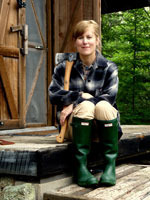
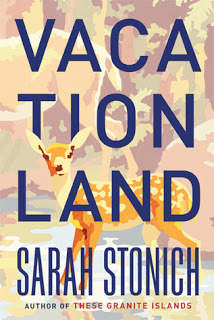
How you can resist a novel with a name like Vacationland? (Says the owner of the blog Carolineleavitville...) I couldn't and I found this book irresistible Sarah is the author of the acclaimed novels, These Granite Islands, The Ice Chorus, and the memoir Shelter. And in honor of the publication of Vacationland, we have four books to giveaway, winner to be announced Saturday, May 11! Just post a comment and remember to check back to see if you won! You can contact me through the blog to get me your address and I'll make sure the book is sent right out to you.
I'm always interested in how books sparked. What gave you the idea for Vacationland. Great title, by the way.
I really like the title too, and in fact it sort of inspired the tone of the book, in that most of us have been someplace that considers itself ‘vacationland’ in some sense, whether it’s a resort or ski chalet, theme park, or summer camp. Also, I liked the idea that Vacationland could be anywhere at all, which is where fiction best takes place.
I loved the way you linked the stories. How was this different than writing your previous novels? What made you decide to structure the book this way?
I had a few stories written, and was inspired by the thought of a guest register at a resort - what stories might have played out in the various cabins these guests are checked into? How one might flip pages back in time and even forward, when some of the names would pop up over and over and others only once.
Your sense of place is so indelible, tactile and every other great adjective I can think of. How do you think place defines character--and acts as a character in itself?
I think characters’ reactions to their surroundings can reveal an awful lot about them, and in that sense place is as much a character in my work as those that breathe and talk. As a failed painter, I like the idea of trying to conjure images, a place, with words.
Tell us about Fishing with Rayanne?Shhh… Fishing With RayAnne isn’t written by me, rather my nom de plume, Ava Finch. But since I know the plot… RayAnne Dahl is a thirty-something fishing pro that accidentally lands in the driver’s seat of the first all-female fishing-talk show on public television.
What's obsessing you now and why?Book tour is obsessing me – I’ve taken time from my work (I’m only writing about two hours a day right now) and the rest of the time I’m doing an amateurish job at playing tireless promoter and social media hack. I love blog tours because I can do them in my jammies.
What question didn't I ask that I should have?Where can readers post reviews of Vacationland? Why, so glad you asked, Caroline. Because it’s so very helpful for the authors to get reviews – even the tepid ones – it changes the online algorithms of “if you liked ____ you’ll love ____” etc.: GoodReads, Library thing, Shelfari, Amazon and B&N are all great places, as well as your blogs. Writers adore bloggers.
And I would add--tell your local indies if you love the book!
Published on May 04, 2013 18:10
Erika Robuck talks about Zelda Fitzgerald in Call Me Zelda, where that fictional nurse comes from, and so much more
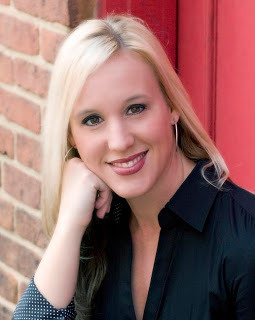
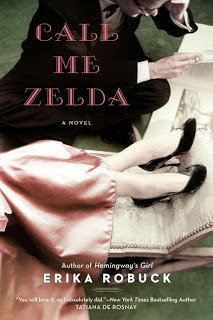
Erika Robuck is an amazing story in herself. She self-published her first novel, Receive Me Falling, but her second novel, Hemingway's Girl was picked up by Nal/Penguin and became a Target Emerging Author Pick, a Vero Beach bestseller, and it's been sold in two foreign markets to date. Call Me Zelda, about a period of time in the life of Zelda Fitzgerald is gripping, smart, and yes, heartbreaking. I'm thrilled to have her here. Thank you, Erika!
Why Zelda? And why now? What do you think she has to say to modern readers?
Hemingway actually led me to Zelda. While I researched HEMINGWAY’S GIRL, I read over and over again how much Hemingway disliked Zelda. Knowing that Hemingway didn’t always have the healthiest views of women, I wanted to learn more about her on my own. I found her life and struggles fascinating and relevant today, particularly to women looking for balance in their business, creative, and domestic lives. I’m also sympathetic to Zelda’s difficulties, and want to show the particular pain of mental illness, demonstrate how it affects families, and explore opportunities for healing.
What was the research like? Did anything surprise you?
So much in the research surprised me. I was shocked to learn that F. Scott Fitzgerald hid Zelda’s diaries because he wanted their life to be “his material,” and that he used some of her writings (even personal letters) in his fiction. I was shocked how devoted Scott and Zelda were to each other in spite of seemingly insurmountable odds. I was surprised what an accomplished artist Zelda was, and how many notable triumphs she had in her life after Scott’s death.
How do you want readers to see Zelda?
I want readers to appreciate Zelda’s unique genius and talent, and sympathize with her struggles with mental illness.
What's your writing life like?
I spend four to five months researching a time period and subject, and then about a year writing the novel. I immerse myself in a character, time, and place as much as possible, and allow the characters to haunt me. I write every day, chasing the time when the words come faster than I can type, when I feel the character guiding me, when I lose track of time and space. I’m always chasing that high.
What's obsessing you now and why?
The poet Edna St. Vincent Millay is my current obsession. I was led to her while doing Fitzgerald research. Two of Scott’s Princeton friends were in love with her, and I have always admired her poetry. She is a fickle muse, and I’m forever wrestling her. I’m confident that my struggles writing about her have been a help to my process because of how she entranced and toyed with so many while she was alive. My novel about her comes out in 2014.
What question didn't I ask that I should have?
You should have asked where I got the idea for my fictional nurse, Anna, the protagonist of CALL ME ZELDA. In the biographies about Zelda, there was often mention of a nurse—a nurse who stayed with Zelda at the Fitzgerald’s house in Maryland, a nurse who escorted Zelda on the train to her art showing who had to sedate her, a nurse Scott accused of helping Zelda submit her novel to his editor without his approval, a character in a short story by Scott... This could have been many different women or one. I chose to make this shadow person my point of view character, give her a life of her own, and allow her to tell us Zelda’s story.
Published on May 04, 2013 17:59
Liz Rosenberg talks about the laws of gravity, what we owe the people we love, education issues, and so much more
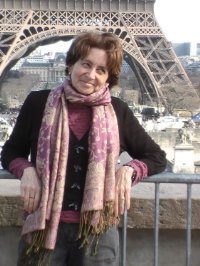
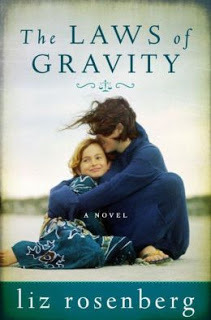
Two families torn apart by a terrible decision. In her new novel, The Laws of Gravity, Liz Rosenberg gets at what we do for love, and why. And I'm not the only one who loved it.
"The Laws of Gravity is a heart wrenching and honest exploration of family love and betrayal. A real page turner right up to its beautiful last page." – Ann Hood, author of The Red Thread andThe Knitting Club
“The Laws of Gravity is an unflinching portrayal of that place where fear and family collide. Part medical drama and part family saga, it reminds a reader of how easily the ties that bind can fray. Heartbreaking." – Chris Bohjalian, bestselling author of Midwives and The Sandcastle Girls
Honored to have Liz here. Thank you, Liz.
So, what sparked this particular book?
The seed of The Laws of Gravity was planted almost 30 years ago when I read a newspaper article about a cousin who had sued his cousin for a medical transplant and lost the case in court. After he died, they asked the surviving cousin how he felt. I had an immediate sense that there was a novel hidden in this-- one couldn't help but think about all the people involved; the family connections, the widow; the judge. But it took me this long to feel I was ready to write that story.
Titles are terribly tricky. I worked on a draft I simply called "The Judge Novel." Then my publisher at some point, very naturally, came to me asking for a better title. I jotted down 5 or 10 phrases that felt right, and The Laws of Gravity instantly felt the most right. I think of a title as an address for where a work lives.
What do we owe to the people we love?
I suppose the easy answer would be-- everything. And nothing. Love is not about debt, somehow, but about gifts. Lewis Hyde's wonderful book THE GIFT explains all that in marvelous detail. At one point in my novel the cranky old aunt says, Family is how we ought to treat everyone in the world, but don't. My own 9 year old daughter takes great comfort in knowing that we're all related. And as Auden reminds us, "We must love one another, or die."
What's your writing life like?
When I'm in the thick of a novel I try to write two pages a day.Every day. I take one day off. Some days I get lucky and write more. I also write single space in order to trick myself. This 2 page rule I got from the novelist Larry Woiwode, by the way. And I do follow Hemingway's advice to stop while the writing is "hot"-- while you know what is tumbling up ahead.
What's obsessing you now?
I think what's obsessing me right now are the problems with education. Especially all the testing we're doing. It all feels terribly torqued. We are valuing the wrong things, paying for things that don't matter and starving out the things that do. It's an insane time in education, really a terrible time to be a public school teacher. I can't imagine how they have the bravery to keep on doing it in the face of all these punishing changes and rules.
Hmmm.. what question didn't you ask that you should have asked?
Maybe you could have asked, what do you hope to accomplish in this novel? Because I would say, I hope this novel touches readers. Not in a simple, sentimental way, but at a deeper level. I threw in everything but the kitchen sink. Maybe I DID throw in a kitchen sink-- I know there's a kitchen counter, a very expensive one, that comes into play. I wanted to talk about love and redemption and family and loss and law and justice. I feel lucky I got to do that. And I'd like to be able to keep on writing books that matter to people.
Published on May 04, 2013 17:57
May 3, 2013
I love Apple! Ibooks is offering sneak peaks of "eagerly anticipated books" including mine!
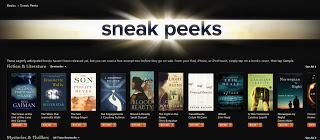
The wonderful and amazing folks at Apple are offering sneak peak excerpts of "eagerly anticipated books" (up to four chapters) including mine, Is This Tomorrow. I'm so, so excited!
Published on May 03, 2013 08:03
May 2, 2013
Leslie Lehr talks about What a Mother Knows, why the term "women's fiction" is totally annoying, writing through illness, why she used the music of The Doors in her novel, and so much more.
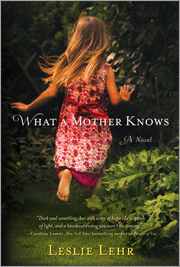
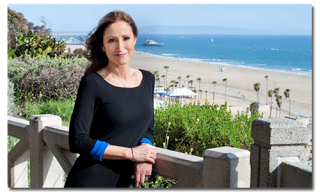
I first met Leslie Lehr because I was obsessed with tracking down her now-husband John Truby, the story structure guru. I wrote John a letter, wanting him to come to my UCLA writing class, knowing how busy he was. When he wrote me to accept, he told me it was because of Leslie, who said, "Are you kidding? You have to do that." How can you not love someone like that? Leslie and I email each other constantly and even though we're on opposite coasts, Leslie makes it feel like she lives next door.
Leslie's a prize-winning author, screenwriting and essayist. Her new novel What a Mother Knows, about how far you might go to protect your child, is out now (Go buy it. Go buy several copies.) And she is currently incognito as Chemo Chick in Karen Rinehart's breast cancer blog, Sick of Pink. Thanks, Leslie. I'm honored to host you here.
Tell me about the back story of your novel?
Three things haunted me into writing this. First, my daughter started crying at night during middle school. She rebuffed my attempts to console her, yet it went on for weeks and it was unbearable. I felt helpless. I would lie awake at night and listen and imagine the worst. My mother said it was typical adolescent behavior, but my family has a history of depression, so I feared the worst. I took her to doctors, transferred her to a new school, but then I worried about her taking the bus near a liquor store - and all the things in LA that I tried to protect her from even while was working in the film industry. Sex, drugs, rock & roll. I wanted to lock her up until she turned twenty-one. I wrote an essay called Parenting Paranoia that Arianna Huffington excerpted in her book, On Becoming Fearless. But I was still afraid. Then I had jury duty on a manslaughter case where two mothers were suing the driver of a car that crashed into a sports bar and killed their sons. The boys were strangers sitting at adjacent tables, and complete opposites, yet we had to help put a dollar sign on the loss these women experienced. Of course, there was no right amount, but it couldn’t be zero, either. And so in the worst of what-ifs, I started worrying about my daughter and how far would I go to protect her.
You and I have talked about the odious term "women's fiction" and all the nonsense going on about whether a book is literary or commercial, and what that means. (You could say Fitzgerald, the darling of his age was commercial, now couldn't you?) Don't you feel a good book is a good book? Can you talk about that please?
Since I’m a woman and write about women, I tend to be categorized as women’s fiction. I wish I’d used my initials, like AM Holmes when I first began writing, just to start with a clean slate. Don’t you think it’s condescending to that there is no men’s fiction, but there is woman’s fiction, as if it has less value? As for the commercial versus literary conflict, this drove me so crazy that when I got my MFA, I ran a seminar comparing a bestseller to a prize-winning novel – I had the other students write the opening of The DaVinci Code as a literary novel and vice versa with a Pulitzer Prize winner. Of course commercial fiction tends to have a stronger narrative drive, more suspense to turn the page. But I love literary fiction because of the lush language and poetic description. The Great Gatsby has both, your work has both, and that’s my goal as well. I spend a lot of time revising, because I love to play with words - I don’t write a book every year, so every sentence counts. I can spend a day on a paragraph. Yet I want to write a good book with a compelling plot, so I try to combine the two by writing beautiful prose in a page-turning story. What A Mother Knows began as a literary tour de force, with parallel tracks of the mother stalking her daughter alternating with how that came to be, how a woman who was working so hard to have it all…nearly lost it all. The story lines came together at the trial towards the end, which still happens. The very end remains the same as well. But it was so dark and angsty that I put it aside and wrote Wife Goes On. Then I came back to it with a fresh eye and restructured it to be the same story but with a single, more dynamic drive – the mother’s desperate search for her daughter. When you said you read What A Mother Knows in two days it cracked me up – so wonderful, and yet so ironic! The best sign of success for this book that has taken me years to get right is that you liked it so much you read it in two days. Ha!
What's incredible about you (among many things) is that in the midst of writing and now promoting your book, you got sick. I have to say that the year I got critically ill changed the way I thought about everything. How has illness changed you? is your writing different, as well?
Fortunately, I’d just turned in the main draft when I was diagnosed with breast cancer. When I wondered if this would be my last book, I felt really grateful that this is the story I always wanted to write, that it says everything I believe to be important and true about mothers and daughters and unconditional love. I was still in denial through the surgeries, but chemo definitely made it difficult to do much of anything. When it was time for final edits, my eyes were tearing so much it was hard to see, my nails were bleeding on the keyboard, and my brain was fuzzy. But the book release is a perfect distraction from feeling awful, and something to look forward to. And thank goodness for the Internet. I can’t tour as much as I’d like, but I can do book club visits all over the world via Skype. Time will tell if my writing is different. I have six more months of active treatment to go. I’ve always appreciated a blue sky, but I hope I don’t worry so much about the gray ones. I still worry about my daughters, though - that’s when I know I’m feeling better.
How difficult was it to write this novel, especially with a suicide in it?
Thank you for putting it like that - since no one dies of suicide in this book, most people would dismiss it as a suicide “attempt.” My belief is that even when a suicidal person recovers, there can be a lingering sense of betrayal or abandonment in those who would have been left behind. That’s what I wanted to explore here, how this unresolved emotion can effect how people behave. I share this legacy with Michelle, the main character, so I always wanted to explore it. When someone near me is really sad and says they don’t want to be alive – even if they are kidding - I tend to take it seriously. In What A Mother Knows, Michelle is fearful for her daughter. There is a fine line between paranoia and possibility.
You also write films. Do you think you use a different mindset to do that, or can you easily switch from one to the other?
I always visualize scenes in my head before I write them, whether it’s a book or a script. I tend to think of simpler stories, like romantic comedies, as scripts right away, but with a powerhouse story like What A Mother Knows, it had to start as a book. There are so may levels of connections between the characters, that it gave me more time to explore them even while upping the suspense. Now that every scene has played in my imagination, it reads like a movie, so I can’t wait to adapt it into a script.
What's your writing life like these days?
You’re looking at it! Remember your earlier question about working during treatment for breast cancer? My critical facilities are recovering from chemo brain more quickly than my creative ones, so I’ve been working on shorter pieces, mostly essays. And I can finally read more than a magazine, so I’m back to my stack of novels, getting inspired for my next one. At the moment, I’m mostly consumed by major life questions, such as which wig I should wear to wear to my book launch party. Think I should go blonde?
What's obsessing you now and why?Wedding shows, because I love the romance and the pretty dresses. Cooking shows, because I lost my taste buds during most of chemo. And of course, I am obsessed about my daughters. What a Mother Knows…is that she will do anything to protect her daughters.
What questions didn't I ask that I should have? Why did you use the music of the Doors?
Before I moved from Ohio to go to college in Los Angeles, my friends warned me about the sex, drugs & rock ‘n roll scene – partly because of the Doors. Even now, decades after they broke up, the Doors are still considered the quintessential LA band. Lead singer/songwriter Jim Morrison exemplified the glamorous dark side. The character of Noah had to be both charismatic and talented, so it was natural to make him a disciple of Morrison, who began as a film student at UCLA known for his poetry as well as his tight leather pants. Morrison died of a heroin overdose in Paris at the age of 27. With Light My Fire, LA Woman, and The End, the Doors are still on every ‘Best Of’ list in rock and roll. They were among the many bands who played at a bar called The Cellar in Topanga Canyon. Since hippies still live in the canyon today, it’s easy to envision Jim Morrison cruising past the tie-dyed peace signs, writing “keep your hands on the wheel” in his ode to that bar, Roadhouse Blues. So Topanga Canyon, where the car accident in What A Mother Knows happens, is a real place that the main character of Michelle, an ‘LA Woman,’ drives through often. Jim Morrison’s lyrics are so compelling that it would be easy for a fan like Noah to use them as communication – and for an impressionable girl like Nikki to follow suit. The music of the Doors helps make this a true LA tale.
What is it like to write love scenes knowing your daughters will read them?Romance plays a key part in this story, so of course there has to be a love scene or two. The big seduction scene in this book is almost a fantasy, but if you skip it, the story won’t make sense. Writing it wasn’t the problem, but giving an early draft to my older daughter so she could make a book trailer for my website was a bit daunting. She hasn’t mentioned that scene. Thank goodness! I hope both of my girls get lucky in love – some day.
Published on May 02, 2013 18:34
April 28, 2013
Jeweler Jeffrey DeLude talks about Banksy, modern art, truth and beauty and love, and so much more
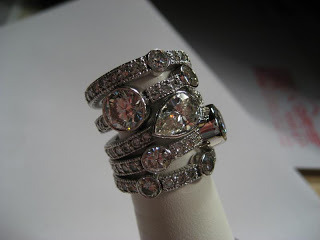
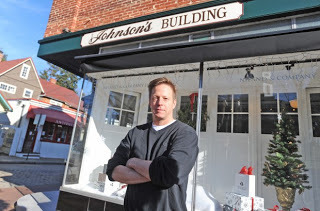
I first met Jeffrey DeLude at the Annapolis Book festival. The amazing literary agent/flower designer Laura Strachan made the introduction and we were soon all talking about Banksy, art, books, and jewelry (he owns Niland & Company Jewelers). I jumped on him and told him he had to come on the blog, and here he is! Thank you so much, Jeffrey!
So, how did you become a jeweler? Do you have a philosophy about the pieces you make, and if so, what is it?
I think I may have been a sculptor and Jeweler all my life. My mother was a art teacher and as children, my brother and I were constantly involved in art projects. My father was a naval officer and we moved a lot. Every new house brought blank walls that my mother encouraged us to fill. Some where along the line, paintings became mosaics, mosaics became collages, collages became multimedia wall hangings and after a while things didn't always fit on the wall. My first free standing sculptures were executed as representational bronzes, I still love the medium, its warmth and versatility is very pleasing. If your ever able to sit I would love to do a bronze of you.
My focus for the last 5 years has been on abstract pieces, primarily executed in stainless steel. My art is a part of my internal dialog. It is the continuation of a conversation sometimes with people long departed, sometimes in the moment, arguments, commentary, love letters, they are all there. To me art is communication. . As is the case with many artist my most difficult times are my most productive. The creation of art is cathartic, calming, helps me regain balance and find my center. Art, good art, is expression that people as a group can share in, and that helps them find a vocabulary to explain elements of the human condition.
You create exquisite custom jewelry. Do you ever think a person or choosing or wanting the wrong design? How is the whole process of creating for someone accomplished?
Jewelry is a form of wearable sculpture. People use it to punctuate important times of their life. We are all aware of the tradition of engagement rings but people employ the creation of jewelery as the physical manifestation of life events that most people do not realize. Jewelry is frequently commissioned as a push gift, a milestone for the birth of a child, anniversary's, christening, bat mitzvahs of course, but also when people finish chemo or have a bypass. People have jewelry made when, parents or children pass away, We make a fair amount of jewelry to celebrate divorces and retirements. Jewelry is art that we wear to express the emotion of virtually any important life event.
The process is simple, people usually come in with a story, my dog died, he was wonderful. Can you make his tag something I could wear day to day. Or I have stones my husband and I picked up in South America on our anniversary trip. I sketch ideas based on things they say, continuously refining the idea by asking questions, white gold, yellow gold, platinum, diamonds, no diamonds scale, I work to put their words into a picture. After the idea is agreed on and a deposit is put down, I create a wax model, sometimes by hand sometimes using CAD and a 3-d printer or milling machine. The model is then cast, using the lost wax process in the agreed upon material. After a considerable amount of finishing and polishing any stones that are needed to be set are set and the piece then goes through final polish. for the most part people make excellent choices, but as with any collaboration there are times I don't agree with their choices. I do my best to guide them. On rare occasions I turn down projects that I don't believe will have a good outcome.
You were really involved with the art scene, especially with Jeffrey Koons. Can you talk about how working with him made you reevaluate how you thought about what is art and what is not? And when you think something isn't art at all?
In the early 80s while I was still in school I worked at a foundry in Beacon NY called Tallix. With out knowing it I helped make works for some of the most successful contemporary artist of our time. Fank Stella, Jeffrey Koons and even a project for Willem De kooning. I wasn't there long, less than a year but the interaction helped shape my view of art. While Frank Stella was very involved with the production of his wall hangings using Styrofoam models and directing the placement of every steel or aluminum piece on a wall hanging, Jeffrey Koons showed up with a pink blowup beach bunny holding a green carrot and had no input what so ever with the exception of saying make it in stainless steel and presiding over the last thirty seconds of polishing. De kooning was in his 90s and he and his wife were having works created from sketches he had done 25-30 years prior. Most artist would have the foundry do only the work that was not feasible to be done by a single artist. Their belief was that Art required sacrifice, like Micheal Angelo becoming almost deformed while working the marble of a statue into shape, many artist felt that it was their actual physical labor that imparted the qualities that made a work "ART". I came to believe that it wasn't how hard you worked, it was your ability to make a observation on the commonality of the human experience. Art is the ability to create or perhaps just present an item or image almost any thing tangible that will help bring to conciseness a feeling or idea in the mind of the viewer. When it comes to art if a tree falls in the forest and there is nobody there to hear it, than not only was there no noise, but with out someone there, the tree did not even fall, may not even exist. Some neuro-scientist believe that ideas can not exist without words to convoy them. Art is that which expands our vocabulary of ideas without words.
Why is Banksy so freaking great?
Banksy is freaking great! He is great because his art brings to consciousness issues of modern society, it gives us a rallying point. He literally draws a line that helps define right and wrong, but he does it in a playful way that says "come on you know what's right" it allows for different points of view. Everything about it, its presentation, execution, how he promotes himself all work together to achieve his end.
What's obsessing you now and why?
I think the things that I obsess about now are some of the things we are all dealing with, privacy or the lack there of, this kind of expansion of society into every nook and cranny of our lives. With our electronic tethers there is no Waldon pond anymore. There are very few places that one can get away to and recharge without the outside world spilling in. A friend of mine, a freelance writer, recently took a month off from all electronic interaction. I was jealous. Smart phones and computers make our lives easier in so many ways but the 24/7 contact can knock you back on your heals. I obsess about love and beauty and just what they are. The older I get the more surprised I am by the answers to those questions. My current works are combinations of stainless Steel and aluminum, some with glass that help explore and expand the conversation of just how love and beauty are related in our brave new interconnected electronic world.
What question didn't I ask that I should have?
You didn't ask if I had read your books
Niland & Company Jewelers79 Maryland AvenueAnnapolis, Maryland443-949-7876
Published on April 28, 2013 10:28
You are now entering The Twilight Zone: Anne Serling talks about her remarkable memoir of her dad, Rod, why a Martian can say things a Democrat or a Republican cannot, and so much more
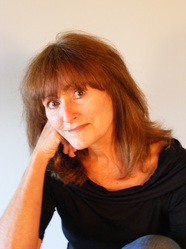
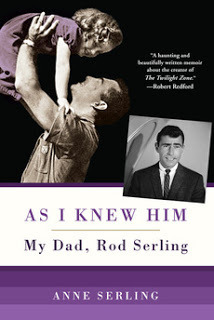
Of course, I love The Twilight Zone. Of course, I had a crush on Rod Serling. When the memoir As I knew Him: My Dad, Rod Serling, arrived, I blazed through it, and then I tracked down Anne. She's funny, feisty, smart, and her book is wonderful. I'm honored to host her here.
What surprised you about writing this book?
That I was finally able to complete it. Seriously, I have been writing this book for two decades. In its original form it was titled “IN HIS ABSENCE.” I couldn’t finish it. I wasn’t ready. I couldn’t navigate my way out of my grief.
What did you learn about your father that you didn't know before?
I always knew my dad was haunted and traumatized by the war. He had the physical reminder- a bad knee from getting hit by shrapnel and his knee would often go out on him and spontaneously bleed; I knew he had nightmares because in the morning he would tell me he dreamt the Japanese were coming at him, but I don’t think I realized the scope of horror that he (or any vet) deals with and is then consumed by for the rest of their lives. When I read the letters to and from my dad and his parents while he was still in training camp- what I found heartbreaking is that they sounded like letters you would write or hear from a child away at summer camp--“Mom sent the brownies you asked for; the SEES candy, everyone misses you,” etc. When I was writing the war chapters, my own son was 18 and so it punctuated just how young and innocent my dad and these kids were when they are shipped off to these horrific and unimaginable wars. I also learned of the vast amount of writing my father did; what he accomplished in only fifty years of life. I once heard him described as a comet.
Part of why I revere Rod Serling is there is such a deep moral sense in his work--and I loved that he turned to sci fi because "a Martian can say things a Republican or Democrat cannot."
He had been censored for so long—and I think the final straw was when he tried to tell the story about Emitt Till- the young African American boy murdered by three white men who were later exonerated. He tried to tell that story in three different scripts. The final one was titled “A Town Has Turned To Dust.” He would later say, “In the end, my script had turned to dust.”
Can you talk about what you call his "accidental fame?"
The first season of “The Twilight Zone” he was never on camera; it was just his voice but by the second season he was on camera and so he became a recognizable writer though my dad was never intended to be the host. That happened quite by accident. The studio originally wanted Orson Welles but apparently that was financially impossible for the studio. Westbrook Van Voorhis did the initial hosting but they didn’t feel he was right. My dad volunteered and although that suggestion was apparently not met with wide enthusiasm—it apparently worked out!
Was he nervous when he first did the Twilight Zone intro? Did he expect he would become such an icon? And how did that change your life at the time?
The director Bill D’ella (Boston Legal, Monday Mornings) who was a student of my dad’s recently told me that my father told him the reason he kept that stiff upper lip was because he was nervous being on camera.
And No, he never expected to become an icon. He was once quoted that although he felt his writing was “momentarily adequate,” he did not believe it “would stand the test of time.” No one, Caroline, would be more shocked than my dad to know how wrong he was. I wish he knew.
I don’t really know how “Twilight Zone” changed our lives. I was four when it began. We had already moved to California before that when live television became history and “writers moved west.” And my best friend’s dad was also a writer so our lives were similar in that respect.
Can you talk a bit about the scary Twilight Zone episodes and how hard it was to connect those with the loving Dad you knew?
The first TZ I saw was the one with the monster on the wing. The one staring William Shatner—“Nightmare at 10,000 feet.” I watched it with my dad and I was TERRIFIED. The fact that he didn’t write that episode was of no consolation- it was still my dad that appeared before and after. But he was nothing NOTHING like that person you hear and see so…I got over it. It was, though, quite some time before I watched “The Twilight Zone” again!
I loved the passages where your father is struggling ("my diet consisted chiefly of black coffee and fingernails" ). Were there any of his writing techniques or tricks that you yourself now use?
I always read aloud what I’ve written when I think I’ve gotten it to an ok place. I recently learned my dad did that too--even before he used a Dictaphone-- and I was thrilled when I heard that because it brought me closer to him in another unexpected way.
Do you ever feel as though he's channeling through you?
Hmm. I always hope so. When he first died, I would say things like “If you can hear me, make that leaf move, or that bird fly now…” But I don’t know Caroline—he’s always in my mind and my heart and I would love to think we’ll be together again someday but I don’t believe that…and that makes me sad. There was a time though; when I was writing the book, and going through a tough time emotionally I found a letter from him. (I had saved all the rest) but this one I found unexpectedly- buried with some other papers. And there was, I guess, that moment where I thought it was meant to be discovered when it was…a gift from the heavens…Also, when I recently did the audio recording of my book and I was sitting alone in this little, dark room under these microphones and I could hear only my voice and I thought of all the times he did recordings…just like that and I felt so close to him, so reconnected.
I wanted to ask about the incredible "Fifth Dimension" program, which draws on the moral parables of the Twilight Zone to teach fifth graders about intolerance and more. Can you talk about that please?
This is such a fabulous program and the teachers are excellent. The kids watch TZ episodes and learn about prejudice, scape goating, mob mentality etc. One of the teachers told the story that after she showed the class “The Monsters Are Due On Maple Street” she asked them, “Who are the real monsters?” And the entire class stood up.
What's obsessing you now?
Hmm. Everything? The horror we humans are capable of…Gun control; That I want my kids to be happy and my granddaughter (who will start Kindergarten next year) to never be bullied—or any child bullied for that matter. I also worry about the people I love getting sick; My next book—a novel called AFTERSHOCKS that I just completed the first draft of; I worry that I love my “granddog” (He was my daughter’s dog but she couldn’t keep him—if she reads this she will say, “But Mom I DID want him back” anyway- that I love him too much and already imagine (and mourn) a life without him.
Thank you Caroline! For everything! Now when are we having that drink?
Published on April 28, 2013 10:28
Brandon W. Jones talks about All Woman and Springtime, being a major success as a debut author, North Korea, men writing about women, obsessions and so much more
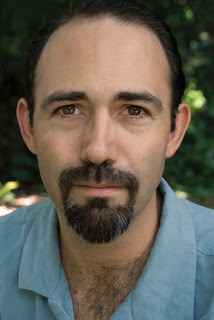
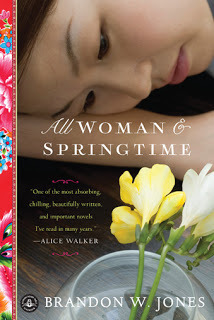
I do my best to read all the novels that my publisher Algonquin puts out, and for two weeks, I was so obsessed with Brandon W. Jones's All Woman and Springtime, that I carried it with me everywhere. About human trafficking and North Korea, All Woman and Springtime's been lauded by Alice Walker, who called the book, "One of the most absorbing, chilling, beautifully written and important novels I've read in many years." I'm so thrilled, jazzed and honored to have Brandon here. (He's also hilarious.) Thank you, Brandon!
You have the career writers dream of! Fresh out of the gate with a debut that lands at Algonquin and racks up the raves. So were there ever any moments of doubt?
I’m still a little in shock about the whole thing, really. In every way this has been a huge personal success, and I’m grateful. There were, and continue to be, moments of doubt. I wrote the novel during a difficult and tenuous time in my life, unemployed in the middle of a global financial meltdown, and undertaking a first novel through it was seemingly the most illogical choice; but I was driven. As for being published, I was painfully aware of the odds. So at times I wrote desperately, plagued by fear that my writing wasn’t good enough, and by a looming sense of possible, even likely failure. The only people I told that I was writing a novel were my wife and two very close friends, who were my fearless champions, and it wasn’t until I had a serious offer for publishing on the table that I told my parents and other acquaintances. I had enough doubt of my own that I didn’t want to field anyone else’s—that could have been crushing. Ultimately it was my belief that I was working on something truly worthwhile that kept me going through the doubt, and keeps me going today.
What sparked the idea for All Woman and Springtime? What surprised you during the writing? What was the researching like?
It started with a fascination with North Korea and wanting to educate myself about the politics of the region after it was branded a part of an “Axis of Evil.” At some point I realized that what was missing from the dialogue about North Korea was the human side of it, as if the only reality in that country was the political one. At the time there were no books like Barbara Demick’s Nothing to Envy and Blaine Harden’s Escape from Camp 14. Writing the novel was partly about me processing everything I was learning about the weird and atrocious conditions in North Korea, and wanting to share my findings with a bigger audience.
I was surprised often while writing the story, first by the reality of North Korea, then by my realization of just how huge the global industry of human trafficking is. Then in the writing of it, my characters surprised me every day with their insights, the things they did and said. It was especially surprising to look through the eyes of the perpetrators in the story to see how they justified their actions to themselves. If people tend to place themselves in the hero role of their own personal stories, then what kind of mental gymnastics must human traffickers perform to maintain their self-as-hero mythology? Asking those types of questions led to surprising answers.
Research on North Korea proved difficult, being that it is the most secretive country on Earth, and I proceeded at first with little more than a library card, a Netflix subscription and an Internet connection. I was able to talk with a couple of people with firsthand knowledge of North Korea, which proved helpful. I even went to South Korean chat rooms on the Internet to try to engage Koreans in discussions on North Korea. It turns out that people going to such chat rooms aren’t looking for heady political conversation, but I did find a few people willing to give me their opinions. Even the most scholarly works on North Korea usually cop to some amount of conjecture.
This was your debut (and what a knockout!) Did you have worries and fears about it? Does it make writing your next novel more difficult or easier? And why?
I was a complete wreck for weeks before my novel released. There is so much hope and anticipation wrapped up in publishing a book, as well as the culmination of years of hard work and a certain amount of baring of the soul. It is a vulnerable place to be, and how a novel lands in the literary world—with a thud or a splash or with no sound at all—has ramifications, so the pressure is on. And it is a unique kind of anxiety, because the work passes a point of no return. You can’t take it back, and what was at one time completely in your control is now completely out of it. There is nothing to do but sit back and gnaw on your fist while it makes its entrance, and hope for the best.
In some ways, writing a first novel from obscurity, uncontracted and without any expectation from a publisher or an audience, felt freer than writing the second. While writing the first book, its potential disappointments were solely my own. With a second novel there is the fear of disappointing and being rejected by my editor, or the audience I’ve built with All Woman and Springtime. There’s the question of whether or not the next novel will live up to the first. It gets easy to second-guess myself by comparing what I’m writing now to what came before, or to that of my peers. It’s also tempting to override my creative impulse by trying to make something that I think will fit as a following act to my debut rather than writing on the cutting edge of my inspiration. A first novel is unfettered by all that. That said, I have a clear sense of how I can improve as a writer because of the first novel, and this gives me something to aim for and makes me excited to write. There is also comfort in knowing that at the end of writing the next one, there is a great publisher ready to give it serious consideration. So it is both harder, and easier. The trick is to focus only on the work and be true to that.
What's your writing life (and regular life) like now?
I try to write every day. Very early morning is always the best time for it, but I can’t always get myself out of bed for those quiet hours. Any time of day will do, if I’m in the flow of a story. I have a special chair for writing that I built myself, that hangs from the ceiling on a swivel and a spring. I don’t write as well from a stationary chair, it turns out. When I get stuck on my novel, I dive into short stories so I can experiment with different voices and styles, or sometimes just so I can have the sense of bringing something to completion—that feeling is maddeningly slow coming in novel length work. Also, one of the great benefits of being a writer is that I can justify reading novels all day as part of staying current in the field. If I can’t bring myself to write, I can usually bring myself to read, so I always feel like I am doing my “job.” I’m not sure I have a regular life.
What's obsessing you now and why?
I’m obsessed with stories of trauma and healing. I’m fascinated by people’s coping mechanisms and their tendencies for either creative self-destruction or creative self-reconstruction. I’m also focused on challenging our culture’s collective beliefs about men’s incapacity to understand women. I was shocked that what seemed to surprise readers most about All Woman and Springtime was how I wrote convincingly about and from the perspective of women—as if by living among and relating with women my whole life, as any man with a mother, sisters, female friends and/or lovers has, shouldn’t be expected to be able to realistically approximate a female experience. I think we’re less shocked when women write well about men. By assuming that men can’t understand women, we end up excusing, and even sanctioning their ignorance of women, and thereby excusing and sanctioning their actions against them. Look at the Steubenville rape case in which a female news reporter so quickly turned to pity for the ruined career opportunities for the rapists while downplaying the trauma to the young woman who now has to heal from those boys’ “mistake.” She seemed willing to excuse their behavior, even blaming it on alcohol, as if the consequence was somehow unfair, as if it were somehow not really their fault; after all, we know how men are, right? Many young men grow up assuming they don’t have to understand women, and there is little social pressure for them to even try. I believe this is cultural learning, not an inherent flaw in men. Those young men in Steubenville raped because on some level they believed it was okay, and because nobody had persuasively encouraged them to see the world through a woman’s eyes. If they had had a developed sense of empathy, there is no way they could have done what they did. This line of thinking, the desire to inspire empathy, drives my writing impulse.
Published on April 28, 2013 10:05
Larry Rossman talks about The New York Yankees (then and Now). yankee legends, the Nike Fuel band and more!
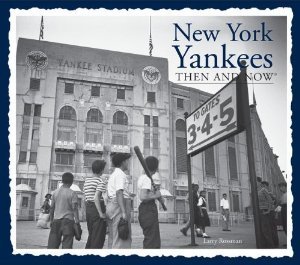
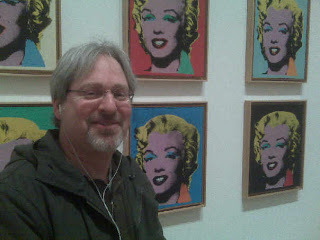
OK, the truth is that Larry Rossman and his wife Amy are two of our greatest friends. Larry and his jewelry- designer-wife Amy have known my husband Jeff since they were all teenagers. But Larry's also an author and I'm honored to host him here on my blog today, to talk about his book The New York Yankees (Then and Now), which is not only fascinating, it's also a gorgeous, gorgeous book. Just take a look at the cover! Thanks so much, Larry!
Why the Yankees?
I've been following the Yankess since I was a kid. I always loved learning about the players and the history of the team. Writing this book was the perfect opportunity to put all the information I had in my head about the Yankees to good use.
So, would you have written a book about the Mets? And does one have to be a Yankees fan to love your book?
I would absolutely have done it if it was the Mets. I am a Yankee fan first but I am also a NY sports fan.One does not have to be a diehard fan to appreciate this book. It is an engrossing pictorial depicting the history of Yankee baseball. The pictures are beautiful to look at and the stories are interesting for their sports as well as their historical and cultural content. Even Red Sox fans would like it.
Let's be frank. What part did the Nike Fuel Band play in the writing?
The Nike Fuel Band kept me motivated.
Did anything drive you crazy about writing the book?
There was nothing I hated about this project. It was really a labor of love. Working on the book brought back memories of my youth in the 60's. Collecting baseball cards, watching games on the black & white TV, and seeing the GREEN field for the very first time when my father took me to my first Yankee game. I loved going through the photos - old and new. Reliving the history of the players and the franchise was nostalgic.
So what's next? My options are open. I would love to do a "Where Are They Now" book about the Yankees and a book on 1960's NY radio.
What's obsessing you now?
What don't I obsess over!!My obsessions in no particular order are: 1- Yankees- my favorite sports team since I was a kid.2- Baseball- the most relaxing sport to watch. 3- Tennis- love to play it.4- Rock & Roll Music from the 60's- I am still living in the 60's.5- Music-All Genres- It's always in my head.6- Collecting Cd's- Can't explain it. Just gotta have them.7- My dog Molly- for her unconditional love.8- Nike Fuel Band- makes me feel like I accomplished something every day.9- Health- Isn't everybody obsessed about it these days?10- Wife & kids- of course.
What question should I have asked?
What Baseball Books Do I Recommend?
1- Ball Four- by Jim Bouton2- Sandy Koufax- A Lefty's Legacy- by Jane Leavy3- The Last Boy- Mickey Mantle & The End Of America's Childhood- Jane Leavy4- The Bronx Zoo- The Astonishing Inside Story of the 1978 World Champion NY Yankees - by Sparky Lyle & Peter Golenbock5- Dynasty- The NY Yankees 1949-1964- Peter Golenbock6- The Glory Of Their Times- The Story Of The Early Days Of Baseball By The Men Who Played It- by Lawrence Ritter
Did I Ever Meet Any Of the great Yankee Legends?:
I have met 4 of my top 5 fave Yankees-
1- Mickey Mantle- He signed a baseball. It was awesome meeting him.2- Yogi Berra- He signed a baseball. He has the biggest hands i have ever seen. Nice guy3- Phil Rizzutto- He signed a baseball. He had funny stories to tell. Nice guy4- Whitey Ford- He signed a baseball. Great sense of humor and loved talking about the game. Number 5 would be Roger Maris who I never met
Published on April 28, 2013 09:54
April 26, 2013
Rebecca Dowling talks about why the Hockessin Book Shelf is so cool
I love indie bookstores, as everyone knows, and I especially love this one, the Hockessin Book Shelf. Even better, I'm going to be reading there June 19th! I love Rebecca Dowling and she was gracious enough to let me pepper her with questions. Thank you so, so much, Rebecca!
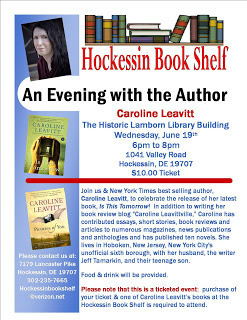
Your store seems to be and do so many great things! Tell us about it!:
The Hockessin Book Shelf is a New & Used bookstore in Hockessin, DE and like our state, the store is a small wonder. We only have 826 sq. feet of inventory space! So most of our activities & events are off site. We have become known for our community partnerships: story time at the creamery, book groups at the gourmet food shop & cafe's, cookbook book club at the Nature Society & "An Evening With The Author" at one of our historic buildings. For us the Shop Local movement is a way of life & our store's health is dependent on the health of our neighbors.
Your store is also famous for being a browser's paradise--Can you tell what books belong with what customer?Most of the time, we've been selling to some of our customers for years or since they were kids and because of the extended conversations that can only happen IN a store. Just a few pointed questions and we are usually on our way to a perfect match :). I have an amazing staff too. They love books & are so well rounded in their reading habits, we have all the niches covered from genre to lit. to children's books. And I do think that the small size of the store helps with this....................we only have to go a short distance to pull the perfect book off the shelves.
What three books are you pressing into everyone's hands and why?What My Mother Gave Me - edited by Elizabeth Benedict. It is the perfect Mother's Day gift!!!! It not only features an essay by you Caroline but one by Elissa Schappell too. She grew up right here in Hockessin!
Beautiful Ruins by Jess Walters. Just out in paperback & will be huge for book groups if I have anything to say about it.
A Land More Kind Then Home by Wiley Cash because it is the Eat Drink Read book group pick for May.
Heartbroken by Lisa Unger. Great Thriller & it will be the perfect summer read.
And the children's book Tea Rex by Molly Idle, Spy Mice YR series by Heather Vogel Frederick (it's a take on James Bond with titles like "For Your Paws Only") & Julianne Baggot's new book "Fuse"
Oh wait, you only wanted 3.................hahahhaha...............
What's been your favorite author event and why?That's such a hard question because they have all been amazing and each author has left their own mark on "An Evening With The Author". I do have to mention that this series of events would not even exist if it wasn't for the amazing Lisa Unger who knocked on the store's door early one morning while I was vacuuming. She was visiting family in the area and wanted to say Hi to the local independent book store!!! And from there an a event was born. The historic building that we hold the event in was at one point the town's library and Elissa Schappell use to check books out from it. After Marisa de los Santos, a favorite of area book groups, she suggested that I contact Julianna Baggott. Julianna's evening was special for me because my niece read "Pure" & loved it so I now have a picture of my 13 yr. niece meeting her first Author in person! Oh, and Julianna's kindergarten teacher came to her event! Rachel Simon fit us in between all of her events and I was able to hook her up with friends who work for the Special Olympics & Sandra Beasley read some of her poetry for us when she was our featured author for her memoir "Don't Kill The Birthday Girl". They've all been fabulous!
How do you see the future of bookstores?It is definitely an interesting time to own an independent bookstore but I'm pretty optimistic. For a time stores were all reducing their size and adjusting to the new reality of e-reading but I've found that most stores have found a happy medium that meets all their readers needs. We could use more space!!! Book stores have always been hubs for community interaction & I do not see that changing. One of the really exciting things that has been happening in the last few years is the increase of events of all types that ultimately bring authors & readers together. Events are becoming cornerstones of our business and the communities in which we live and work really do appreciate that.
Enjoy reading,
Hockessin Bookshelf
(302)235-7665
Published on April 26, 2013 12:09



